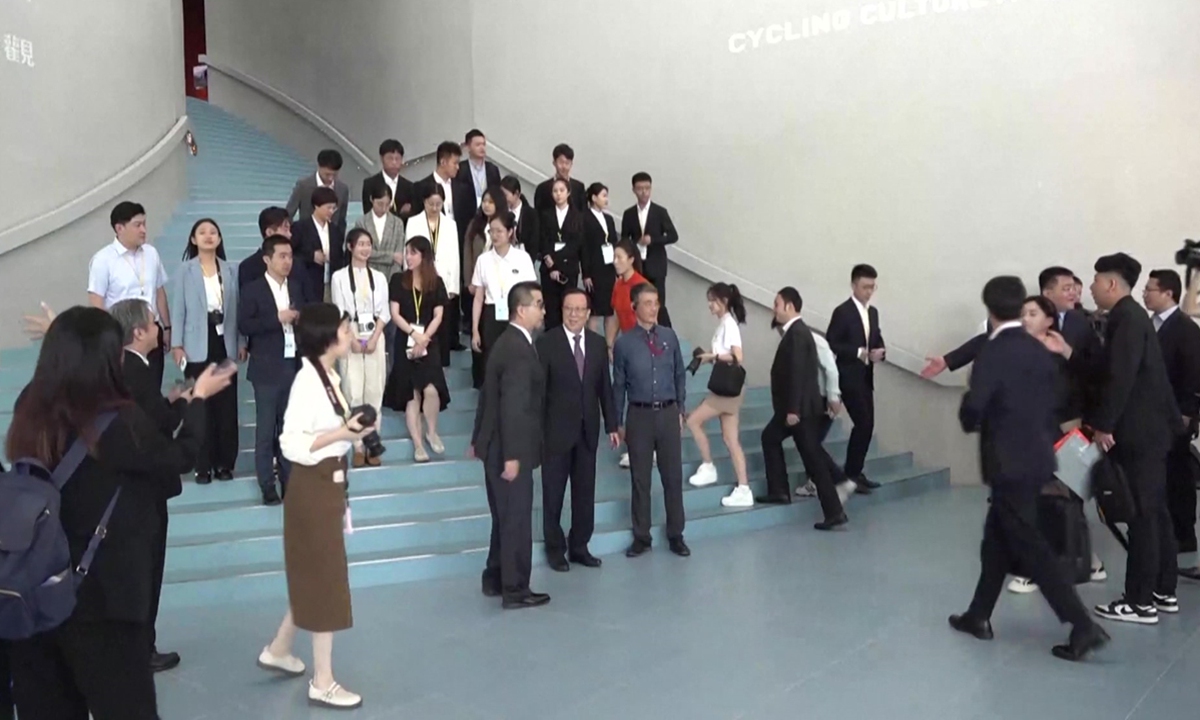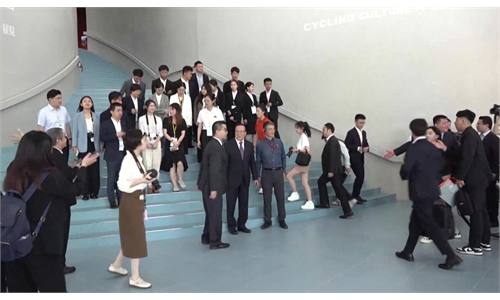
A group of 37 teachers and students from Chinese mainland universities arrive in Taiwan island for their exchange visit on July 15, 2023 at the invitation of the Taiwan-based Ma Ying-jeou Foundation.Photo: VCG
On Sunday, a group of teachers and students from Chinese mainland universities concluded their visit to the island of Taiwan. This is the first time in more than three years that mainland universities have organized a delegation to the island for exchanges. I was one of the members of the delegation, and our trip received great attention from the media of the island. At the same time, the delegation was also warmly welcomed by the local people in Taiwan.
We visited four universities on the island this time, and the exchanges between students from both sides of the Taiwan Straits were extremely enthusiastic. What impressed me the most about the trip was that during the exchange at National Taiwan University, I met a local student who had studied at Fudan High School in Taiwan. When we found out that the school anthem used by Fudan High School was the same as that of Fudan University in Shanghai, we sang the school anthem together. This made us feel that education on both sides of the Taiwan Straits has the same root and origin.
During the exchanges, I could really feel the energy and enthusiasm of the teachers and students on both sides of the Straits flowing without any obstacles, and this kind of emotional interaction was natural. Such sympathy echoes the needs of human beings, and cross-Straits exchanges cannot be blocked or hindered by any factor.
In the process of exchanges with teachers and students in Taiwan island, we discussed many realistic issues. For example, the theme of the discussion at the Chinese Culture University was "Strategies and Development Opportunities for Cross-Straits Higher Education under the Trend of Fewer Children." During the talk at the Chengchi University, one Taiwan student asked the students of the delegation, "What is your understanding of the Chinese dream?" It can be seen that young people in Taiwan island are concerned about the development and important issues in the Chinese mainland, which is very different from the attitude of the Taiwan authorities toward the delegation.
During the visit, some Democratic Progressive Party (DPP) legislators called the delegation a "United Front group." I think this is a sign of the DPP's weakness and lack of confidence. There were only 37 people in the group, but the DPP claimed that it was a "United Front" against the 23 million people in Taiwan, which could not be the case.
The most important part of the visit was the homage paid to traditional Chinese culture by youths from both sides of the Taiwan Straits. The delegation found that all the buildings of the Chinese Culture University are in classical Chinese style, which made the teachers and students on both sides of the Straits feel particularly close to each other. During this visit, former Taiwan regional leader Ma Ying-jeou often sat among the students during meals and communicated with us in his native Hunan dialect. These are reflections of the fact that the two sides of the Taiwan Straits share the same roots and speak the same language and that "we are brothers who are still connected by our flesh even if our bones are broken."
Exchanges and visits among the people on both sides of the Straits can accumulate more positive energy for the future peaceful development of both the mainland and the Taiwan region. What impressed me a lot is that once, when the delegation was touring the Maokong Gondola in Taipei, a local resident suddenly ran over to us and introduced all the famous scenic spots in the Maokong area to us, which shows that Taiwan compatriots welcome mainland teachers and students to come to the island for exchanges.
This visit has promoted more mutual trust, understanding and exchanges among people on both sides of the Taiwan Straits, especially among young people. After the epidemic, we expect that mutual trust and visits across the Taiwan Straits can be normalized.
After this visit, I believe that young people on both sides of the Taiwan Straits should join hands to build a strong sense of community, and take on the important responsibility of deepening the peaceful and integrated development of cross-Straits relations. Only when young people from the mainland and Taiwan region share the same feelings and realize that they have the same roots and culture can they shoulder the future of the Chinese nation together.
The author is the director of the Hong Kong, Macao and Taiwan Affairs Office of Fudan University. opinion@globaltimes.com.cn

